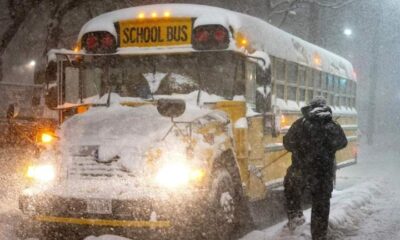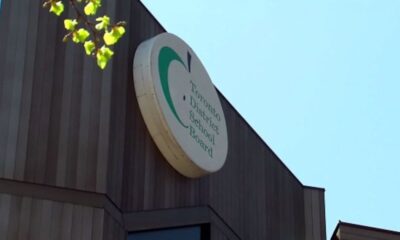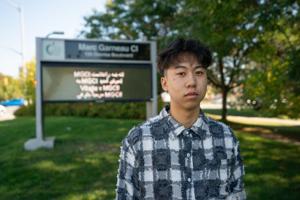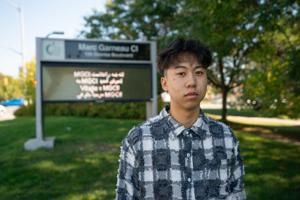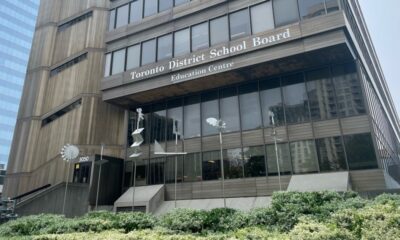Education
Lottery Admissions Spark Division in Toronto Schools: A Two-Year Review
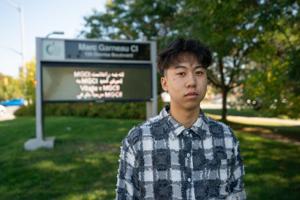
A two-year experiment with lottery admissions in Toronto’s specialty schools has generated significant debate among students, parents, and educators. The Toronto District School Board (TDSB) replaced merit-based admissions in 2022 with a lottery system for its specialized programs, prompting mixed reactions about its impact on both student engagement and educational quality.
At Marc Garneau Collegiate Institute, Grade 12 student Victor Jiang observes a decline in student participation in clubs and activities. He attributes this shift to the lottery system, which he believes has “drastically” altered the caliber of programs, leading to a less motivated student body. Jiang, who is also a TDSB student trustee, states, “It profoundly hurts the student community.” The board plans to update its admissions policy soon, as applications for the upcoming year will open in November 2023, but declined to provide further comments on the matter.
Critics of the lottery system argue that it has not delivered the promised diversity and has weakened the quality of educational programs. Many students and parents contend that the lottery has led to increased student attrition rates and has attracted participants who may not have a genuine interest in the programs. The previous merit-based system required auditions, entry exams, and portfolios, which many believe ensured a higher caliber of student engagement.
The TDSB’s new policy aimed to create a more equitable admissions process. Under this system, students are selected randomly, with priority given to under-represented groups, including Indigenous students and 20 percent of seats allocated for Black, Latin American, and Middle Eastern students. In math, science, and technology programs, half of the spots were reserved for female students.
Ayan Kailie, whose daughter attends Etobicoke School of the Arts (ESA), supports the lottery system as a means to provide opportunities for students who may face financial barriers. Kailie’s daughter is thriving in an environment that she feels is a perfect fit. However, she recognizes that her daughter may not have gained admission under the previous merit-based model due to financial constraints. Kailie believes the lottery system offers a fair chance for all students, regardless of their background.
In contrast, Patricia Warnock, head of the music-theatre program at ESA, advocates for a return to merit-based admissions but with added equity measures. She notes that the school previously implemented various initiatives to increase access, such as redesigning audition processes and offering free workshops. Warnock asserts that while the lottery has changed the admissions landscape, it has resulted in higher dropout rates and a decline in student engagement, leading to a mismatch between student interests and program offerings.
Current enrollment data highlights these concerns. The Grade 11 musical theatre class saw a drop in students from 44 to 35 since the lottery’s introduction. Warnock observes that many students enrolled in specialized programs lack the necessary passion and engagement, with some parents pressuring their children into programs they do not truly desire.
Students like Hailey Jackson from Rosedale Heights School of the Arts echo these sentiments. Jackson has noticed a decline in school spirit and participation in events compared to her earlier years. She expresses concern that the lottery system could prevent talented students from participating in specialized programs. Jackson believes that equity can still be achieved within a merit-based framework.
Michael Danishevsky, co-chair of the parent council at William Lyon Mackenzie Collegiate Institute, criticizes the lottery as a failed experiment that has diminished academic standards. He claims the introduction of random selection has led to increased dropout rates and a struggle to balance classes with varying levels of preparedness.
Research conducted by Danishevsky, along with University of Toronto economist Marcin Peski, has analyzed the impact of the lottery system on student performance. Their findings indicate a decline in TDSB student performance in national math contests following the introduction of the lottery admissions policy. For instance, none of the TDSB schools ranked among the Top 20 in the Grade 10 math contest in 2025, compared to four schools in 2024.
As the TDSB prepares to review its admissions policy, the ongoing debate reflects the complexities of balancing equity and academic excellence in specialized school programs. Stakeholders across the board continue to advocate for solutions that ensure all students have access to quality education while maintaining the integrity of specialized programs.
-

 Politics4 weeks ago
Politics4 weeks agoSecwepemc First Nation Seeks Aboriginal Title Over Kamloops Area
-

 World5 months ago
World5 months agoScientists Unearth Ancient Antarctic Ice to Unlock Climate Secrets
-

 Entertainment5 months ago
Entertainment5 months agoTrump and McCormick to Announce $70 Billion Energy Investments
-

 Science5 months ago
Science5 months agoFour Astronauts Return to Earth After International Space Station Mission
-

 Lifestyle5 months ago
Lifestyle5 months agoTransLink Launches Food Truck Program to Boost Revenue in Vancouver
-

 Technology3 months ago
Technology3 months agoApple Notes Enhances Functionality with Markdown Support in macOS 26
-

 Lifestyle3 months ago
Lifestyle3 months agoManitoba’s Burger Champion Shines Again Amid Dining Innovations
-

 Top Stories2 months ago
Top Stories2 months agoUrgent Update: Fatal Crash on Highway 99 Claims Life of Pitt Meadows Man
-

 Politics4 months ago
Politics4 months agoUkrainian Tennis Star Elina Svitolina Faces Death Threats Online
-

 Sports5 months ago
Sports5 months agoSearch Underway for Missing Hunter Amid Hokkaido Bear Emergency
-

 Politics5 months ago
Politics5 months agoCarney Engages First Nations Leaders at Development Law Summit
-

 Technology5 months ago
Technology5 months agoFrosthaven Launches Early Access on July 31, 2025

